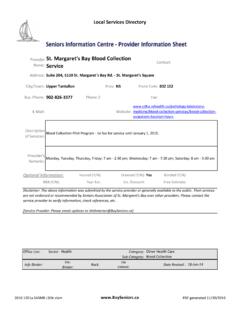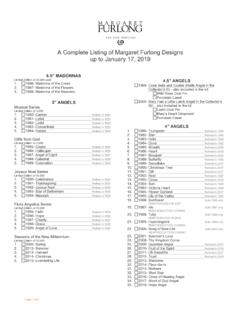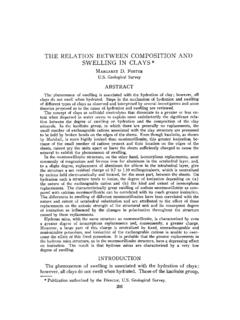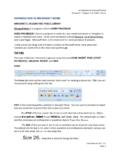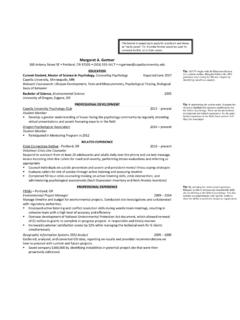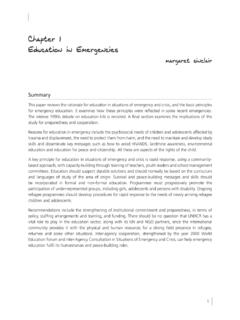Transcription of Chaos and Complexity: What Can Science Teach?
1 Chaos and Complexity: Teach? What Can ScienceKeynote Address by margaret J. Wheatley, Ed. around us and within us we ex-perience complexity and diversityEverywhere around us and within us we ex-perience change, death, and renewal; orderand Chaos ; growth and decay that becomesnew lifeEverywhere around us and within us we seepattern upon pattern, ever-deepening levelsof complexity and varietyWhy do we resist the vision or blind our-selves to the beauty or fail to embrace thelearnings?Eachof us lives and works in organi-zations designed from 17th century images of the uni-verse. The universe of Isaac Newton and Francis Baconwas a seductive place filled with clockwork imagespromising us prediction and reliability, teaching us toview everything, including ourselves, as machines. Welearned to manage by separating things into parts. Weengaged in planning for our future that we would deter-mine.
2 We sought for more and more precise and correctmeasuresof a world we thought was three centuries wehavebeen planning, predict-ing and analyzing the world. We'v~ held on to an intensebelief of cause and effect and we've let numbers rule ourIives. But at the end of the 20th century, ou r 17th centu ryorganizations are crumbling. Our world grows more dis-turbing and mysterious. Our failures to predict and con-trol leer back at us from many places. Yet to what elsecan we turn?Ifour world is not predictable, then ourapproaches cannot work. But then, where are we?Our organizations are strong complicated struc-tures that are resistantto change, fearful of the future andwe have built them that way deliberately. We built themthat way to hold back the forces that seem to threatentheir very existence. We are afraid of what would hap-pen if we lose our let the elements of our or-ganizations recombine or reconfigure or even to speaktruthfully to one another, we are afraid that things will fallapart.
3 We do not trust that this is a world of growth, reju-venation and process. We believe we must provide theenergy to hold it together. By sheer force of will, we haveresisted destruction. And if we let go, the world will ,throughout the universe, things work very wellwithout us. Wherever we look, we see a landscape of2OD PractitionerYet, throughout the universe, things work very wellwithout us. Wherever we look, we see a landscape ofmovement and complexity, of forms that come and go, ofstructures that are not from organizational charts or jobdescriptions, but from impulses arriving out of deep natu-ral processes of growth and of desireto control our organizations, we have detached ourselvesfrom the forces that create order in the universe. Allthese years we have confused control with order. Sowhat if we reframed the search?
4 What if we stop looki ngfor control and begin the search for order, which we cansee everywhere around us in living dynamic systems?It is time, I believe, to become a community of in-quirers, serious explorers seeking to discover the essenceof order-orderwe will find even in the heart of is time to relinquish the limits we have placed on ourorganizations,time to release our defenses and to take up new lenses and explore beyond ourknown boundaries. It is time to become full participantsin this universe of emergent the early Greeks, the universe that they inhab-ited was peopled with many primordial beings. The firsttwo founding parents of all that we observe in life weretwo gods: Chaos , the original abyss of darkness, andGaea, the earth mother, the generative force. These twopartners worked in tandem.
5 Gaea knew that she wouldbe unable to create anything that was alive withoutreaching into the dark abyss of Chaos and pulling forthwhat she needed from there to give form to Iife. These arevery different assumptions about the workings of chaosand order than those that have played into our start, I would like to say that we function as acommunity of people who still want to make a differ-ence. People who really want to change life in organiza-tions for all of us. Who really want organizations to feelalive and worth working in, and adaptive and resilient;organizationsthat no longer worry about managingchange, but instead, real ize that change is a constantprocess of life. I assume that's who we the assumption of our good hearts and ourgood intent, there are several other assumptions that,when I look at it, are severely hampering our work.
6 I amgoing to list three, some of which are fading in I also know how deep these assumptionsare imbedded in me #1: ORGANIZATIONS AREMACHINESThe first assumption is that organizations are, infact, dead. They are machines. This is the 17th centuryimagery of Sir Isaac Newton, that the world is a clock-work have really bought this one! Justlook at our language. We have tools and have have mechanisms. We have levers for change. We havehands-on is really hard to avoid using amachine metaphor. I have tried to avoid it and they stilljust creep right in. It's part of our deep thought is time, Ibelieve,tobecomea communityofinquirers,serious explorersseeking to discovertheessence of Chandler to Michael Porter, people who have madeenormous contributionsto organizationalstrategy allcame from engineering backgrounds.
7 And today, whatdo we have? Reengineering! I hope this is the last gaspof the machine #2: CHANGE HAPPENS AS ARESULT OF EXTERNAL INFLUENCESThe second assumption that we've labored under isthat change happens as a result of some external influ-ence. Here again, our language is quite revealing. Weconsider ourselves to be change agents or change mas-ters. Our whole field of organizational development saysthat organizations need to be developed by us-who elsebut us. Change, in this assumption, is something we make it happen. We impose it on the have long discussions on where to intervene-doyou start at the top, do you start at the bottom, do youhope for the middle? We talk about strategies that needto cascade down throughout the whole talk about training designs in which everyone see the change as some external forcethat is imposed on this inert lump of an #3: THINGS FALL APARTThe third assumption is the one that I personallyfind the hardest to let go of-itis that "things fall apart.
8 "Itis the natural tendency of all living things, as our cul-ture has taught us. We subscribe to the second law ofthermodynam ics (wh ich we have misunderstood buthave deeply taken into our consciousness) that the natu-Fall 19933 Iral state of everything is to decline and die, and to turn torust in front of our eyes. And that the only way to avoidthis tendency toward deterioration and death is to comein with our good creative energy and impose it on has been a very fearsome and costly posture-for all of Western culture. But it is this great belief that,"without me, the world doesn't work." If you talk to meabout letting go of control, it means the world is going tofail. I don't know what else this is if it's not playing God,and that is a fearsome assumptions blind us to some very #1: ORGANIZATIONS ARE LIVING,DYNAMIC SYSTEMSThe first truth, which you have discovered in yourown work, is that it is much more fun to view organiza-tions as living, dynamic, breathing systems with a life oftheir own.
9 These are wonderful beings, these organiza-Nothing held long enoughto see a result. Andamong consultants that Italked with, there wasalways wonderifsomething really We don't understand them but if we think of themas alive, a whole different approach is available to #2: CHANGE IS AN INHERENTCAPACITY OF LIVING SYSTEMSThe second truth is that change is an inherent ca-pacity of living systems. All of us are here, no matterwhat we are on the planet, no matter what kind of lifeform we are, have a deeply imbedded process to createourselves, to maintain ourselves and to change ourselvesif required, to 't think other living systemstake classeson "resistance to change." But I don't know,because I don't communicate with them. We need tostart observing that change is a process that we are capa-ble of and that perhaps we even know how to handle, ifwe could clear away this debris of 20th century #3: ORDER IS INHERENT IN THEUNIVERSEL astly, our deep assumptions have prevented usfrom seeing that order is inherent in the universe.
10 Thereis in each of us a tendency to organize toward greater andgreater levels of order or SEARCH FOR NEW LENSESThe question from yesterday's session with theSages was, "Are we doing significant, authentic work?Are we not polluting organizations by our presence?" Inworking with other consultants, I noticed how rare it wasfor consultants to feel they had accomplished somethingof value that was going to last. There was far too muchchange, far too much held longenough to see a result. And among consultants that Italked with, there was always wonder if something years ago I embarked on work that was newand interesting, which I approached very fearfully. I wasintrigued by natural think there are manyplaces to look for new ways of seeing, and I realized as Ientered into that inquiry, that something was required ofme that I wasn't quite ready to do.
